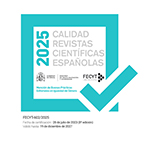Análisis discursivo y lexicométrico de la rebeldía en la prensa española
Resumen
El interés de este artículo estriba en explorar las diferentes significaciones que puede adquirir la rebeldía, así como el lenguaje asociado a ella a través de discursos en prensa española. Para ello, se plantea la rebeldía como un objeto del discurso que ejerce un dominio con el que se hace reconocible en la pluralidad de ámbitos en los que puede emerger. Metodológicamente, se han combinado técnicas cualitativas y cuantitativas, aplicando un análisis discursivo y lexicométrico sobre una muestra significativa obtenida de cuatro diarios españoles. A partir del mismo se describen las diferentes superficies del discurso en las que emerge la rebeldía en relación con distintas realidades sociales, identificando su dominio mediante la interrelación entre sujeto, acción y relaciones de poder. Desde esta interrelación se profundiza, recurriendo a la categorización en base a la frecuencia de uso de palabras, en la construcción de lo que se ha denominado lenguaje rebelde.
Descargas
Descarga artículo
Licencia
La revista Estudios sobre el Mensaje Periodístico, para fomentar el intercambio global del conocimiento, facilita el acceso sin restricciones a sus contenidos desde el momento de su publicación en la presente edición electrónica, y por eso es una revista de acceso abierto. Los originales publicados en esta revista son propiedad de la Universidad Complutense de Madrid y es obligatorio citar su procedencia en cualquier reproducción total o parcial. Todos los contenidos se distribuyen bajo una licencia de uso y distribución Creative Commons Reconocimiento 4.0 (CC BY 4.0). Esta circunstancia ha de hacerse constar expresamente de esta forma cuando sea necesario. Puede consultar la versión informativa y el texto legal de la licencia.










